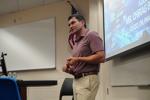
Foundations of FinTech students sit in on Chirag Bhavsar’s lecture. Bhavsar encouraged the students to share their knowledge of cryptocurrency, asking how they think it can be used in banking.
UCF’s FinTech master’s degree program became the first of its kind to be offered in collaboration with computer science this fall.
FinTech student Hend Aljeeb traveled 7,541 miles away from his home in Bahrain just to attend the program.
“I really liked UCF because it is a cross-discipline between the computer science college and the business school,” Aljeeb said. “It was the only program of its kind offered at the time.”
FinTech itself is a relatively new program for UCF. The study started in 2019, where FinTech was offered as a secondary program and a certificate degree.
“It started with seven, eight students, then went up to 12. Now I have 16, and the next year we have 25 for minors or diplomas,” said FinTech co-director and professor Christo Pirinky. “I think they are a good group of people. The undergraduate program has gone well.”
The three FinTech programs teach students about FinTech with varying levels of detail, according to UCF’s degree information.
The certificate is limited to majors in economics and accounting. Students in the certificate take three hours outside the program which gives them the opportunity to develop their specialization in FinTech. Diplomas are awarded to students when they complete their degree.
The minor is a nine-credit program where students must take three courses. Students in minors are introduced to programming, coding and finance, but do not take any of the FinTech courses designed for the master’s degree.
“It was always talked about as a master’s program, but we couldn’t get all the approvals in place before,” said economics department head Ajai Singh. “The first discussion from the very beginning was for a master’s program, but since we had the resources in place, we could offer it, and so we decided while we were kind of treading water on the second master’s initiative, we should take the opportunity to start the bachelor’s program .”
Through the 16-month Master’s programme, students learn in detail how they can use technology better in the financial world. Finance professor Eshwar Venugopal said master’s students are given the tools to be able to determine which technology best serves a given financial service or product.
Aljeeb said UCF’s FinTech program specifically provides students with a better understanding of the financial sector, as well as providing better and more seamless technology products to help fulfill current gaps in the financial services industry.
Venugopal teaches Foundations of FinTech, where he builds bridges between economics and technology.
“Mine is like the middle child, in a way, between economics and technology. It’s trying to look at everything in the room and trying to understand, “Okay, which technology is being used in which financial domain?” and how the products are made. It is meant to be an overview of everything in FinTech,” said Venugopal.

CNL Financial Group co-CEO Chirag Bhavsar talks to Foundations of FinTech students. He spoke to the students about the effects of blockchain and cryptocurrency in banking.
The Master’s study consists of 10 subjects, with a focus either on the financial or technical aspects of businesses. Together, the courses give the students a deeper understanding of both sides of the business world.
“You’ll develop a critical thinking ability to look at how a business or industry is running today, try to figure out what the problems are over there, and then try to come up with solutions,” Venugopal said.
Singh said the master’s program currently has 70 students, divided into two groups. One section is taught online, and only available to students who already have a career in business. It is the largest of the two groups, with 42 students.
“People in the online program have work experience. They usually have at least three years of work experience, Singh said. “Most of them are already working.”
67-year-old Joe Diamond is an online student who felt compelled to return to school after learning about the program. He received his first master’s degree in computer science from UCF, and his son graduated from UCF this past year.
“UCF has always played a very important role in my life. It felt right to come back when I heard about the program,” Diamond said.
Diamond already has an established career. He works as Engineering Lead Digital Channels at Chase in New York. But when he heard about the program, he knew he had more to learn and was eager to return.
“This program is a catalyst for change,” Diamond said. “I’m excited about growth and the exchange of information.”
Although Diamond is older than many of his peers, he does not feel that he is benefiting from the program any less. He said he’s learning leading-edge and forward-looking information, and it’s already affected the way he looks at his job.
“I don’t really feel that old. I feel at the same level as a 27-year-old, without advantages in terms of experience and knowledge, said Diamond.
The face-to-face group consists of 28 students, and they tend to be younger. They are in their 20s and join the master’s program after completing their bachelor’s degree.
FinTech master’s student Carson Reeder is one of those students. He met with his advisor, ready to plan for next semester and was told he was ready to graduate. Graduation had crept up on him and he didn’t feel ready. He was relieved to learn about the new Master’s programme.
“I wasn’t mentally prepared to leave college,” Reeder said. “There just happened to be a new master’s program coming out for something I was extremely interested in at the exact time. It was too good, too perfect.”
He applied for his master’s degree straight away.
Reeder said applying to the program was easy. To apply to the program, students must have a STEM or business-related bachelor’s degree with a minimum 3.0 GPA. They must submit their CV and a 500-word statement of purpose. Letters of recommendation are not required, but two may be submitted.
“I was really nervous, but ended up getting in,” Reeder said.
FinTech is new to the business world, but many companies want in. Reeder said companies are starting to specifically seek out people who have FinTech experience.
“I know a lot of banks want to switch from traditional methods more to FinTech methods, the same for large companies, so it’s kind of like a hiring war between banks and companies to see who can upgrade the fastest,” Reeder said.
Reeder wants to become a real estate investor and said FinTech will help him be more successful in the real estate industry. He joined the master’s program on a whim because he wasn’t ready to take the exam and finish school and has learned a lot in the program since.
“I just like to be ahead of the curve. I think it’s super exciting to learn brand new things instead of things that might be out of date, Reeder said.
COB’s FinTech program has expanded greatly since its inception and will continue to grow as FinTech becomes popular in business. Singh said that as more companies seek FinTech degrees, the program expects enrollment to increase.


























